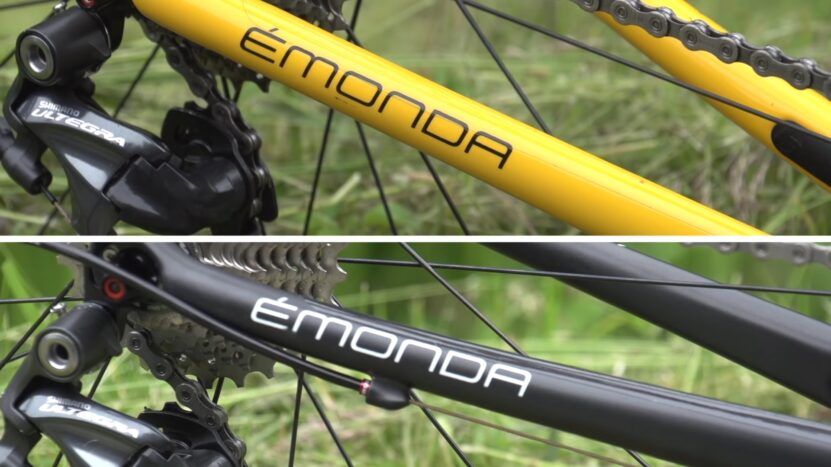When it comes to choosing a bicycle frame, there are two main materials that you can choose from carbon fiber and aluminum. Both have their own advantages and disadvantages, so it’s important to know what each offers before making a decision.
Here’s a quick rundown of the pros and cons of each material
Carbon vs Aluminum Bike
The difference between carbon and aluminum bikes is evident in their looks and how they perform. Carbon bikes are usually lighter and more comfortable to ride, while aluminum bikes are known for being more durable.
However, both materials have their own advantages and disadvantages that need to be considered before choosing one over the other.
Carbon Fiber:
- Lighter weight than aluminum, making it easier to pedal and climb hills
- Higher in price than aluminum
- Frames made from carbon fiber can be more fragile and are more difficult to repair if damaged
Aluminum:
- Heavier than carbon fiber, making it more difficult to pedal and climb hills
- Less price than carbon fiber
- Frames made from aluminum are more durable and easier to repair if damaged
Carbon vs Aluminum Mountain Bike

For mountain bike riders, the choice between carbon and aluminum is one that often comes down to personal preference. However, there are some key differences between the two materials that can help riders make a decision.
Carbon is a strong and lightweight material that is often used in high-end mountain bikes. It is very stiff, which makes it great for aggressive riding and racing. As, Carbon is lighter weight, making it easier to maneuver your bike on rough terrain. It also has some vibration-damping properties, so it can make for a smoother ride. However, if it cracks, it can be difficult to repair and will be more costly.
Aluminum is a more affordable option that is often used in entry-level and mid-range mountain bikes. It is not as stiff as carbon, but it is still strong and lightweight. As, aluminum tends to be stiffer, making for a rougher ride. Aluminum frames may not last as long as carbon frames, but they are a great option for budget-conscious riders. However, they’re also easier to repair if they’re damaged.
Carbon vs Aluminum Bike Frame
When it comes to bike frames, there are two main materials that you will see, carbon and aluminum. Both of these materials have their own set of advantages and disadvantages, so it is important to understand each one before making a decision about which frame material is right for you.
Carbon frames are often seen as the gold standard in the bike world. They are incredibly lightweight, which means that they will not weigh you down on long rides. Carbon frames are also very stiff, which provides a smooth ride. However, carbon frames are also very expensive and can be difficult to work with if you are not experienced in frame building.
Aluminum frames are a great alternative to carbon frames. They are much more affordable, while still providing a lightweight and stiff ride.
Aluminum is also much easier to work with, which means that it is a great option for beginner frame builders. However, aluminum frames do not have the same strength-to-weight ratio as carbon frames, so they are not as light.
Carbon vs Aluminum Bike Weight

When it comes to weight, carbon is the clear winner. A carbon frame can be up to 60% lighter than an aluminum frame of the same size. This makes a big difference when it comes to climbing hills or accelerating.
Here’s a look at the average weights of both types of bikes:
- Carbon: 15-18 pounds
- Aluminum: 20-24 pounds
Carbon is also much more comfortable to ride, absorbing vibrations and road bumps that would otherwise be felt by the rider. Aluminum bikes are not as light as carbon bikes, but they are typically more durable. This is due to the fact that aluminum is a much stronger material.
As a result, aluminum bikes can be ridden on rougher terrain without as much worry about damaging the frame.
Carbon vs Aluminum Bike Price
The cost of carbon and aluminum bike frames is also a consideration. Carbon frames are usually more expensive than aluminum frames, but this difference in price has been decreasing in recent years.
Carbon fiber bikes are typically lighter and stiffer than aluminum bikes. Carbon fiber frames can also be molded into complex shapes, which allows for more advanced frame designs.
Aluminum bikes are usually less expensive than carbon fiber bikes, but they are also typically heavier and not as stiff. However, aluminum frames can be made into very complex shapes, which can give them an advantage in terms of aerodynamics.
Carbon vs Aluminum Bike Damping

Carbon frames are often praised for their smooth ride quality. This is because carbon is very good at absorbing vibrations from the road. Carbon frames can also be designed to be very stiff, which is great for power transfer when pedaling. Aluminum frames are often cheaper than carbon frames. They are also typically stiffer, which some riders prefer.
However, aluminum frames can transmit more road vibrations to the rider. This can make for rougher ride quality.
Carbon Bike Pros
- Carbon bikes are incredibly light, which means they’re easy to ride and accelerate.
- They’re also extremely stiff, so you’ll get more power transfer when you’re pedaling hard.
- Carbon bikes tend to have a smooth ride quality, thanks to the material’s natural vibration-damping properties.
Carbon Bike Cons
- Carbon bikes can be quite costly, so you’ll need to make sure you’re getting value for money.
- They’re also quite fragile, so you’ll need to take extra care of your carbon bike to prevent damage.
- Carbon bikes can produce a lot of road noise, so you might want to consider other materials if you’re looking for a quiet ride.
Aluminum Bike Pros
- Lighter weight than other bikes
- The stiff frame provides an efficient pedaling platform
Aluminum Bike Cons
- More affordable than other bikes
- May not be as comfortable to ride on rough roads.
Why Are Carbon Bikes More Responsive?

There are a few reasons why carbon bikes tend to be more responsive than their aluminum counterparts.
- First, carbon is generally lighter than aluminum, so it requires less energy to get up to speed.
- Second, carbon is stiffer than aluminum, so it transfers power more efficiently from the pedals to the wheels.
- Finally, carbon absorbs vibrations better than aluminum, so it provides a smoother, more comfortable ride.
In short, carbon bikes are generally lighter, stiffer, and more comfortable than aluminum bikes, making them ideal for racing and other high-performance applications.
Are Aluminum Bikes More Durable?
Yes, aluminum bikes are more durable. They don’t corrode as easily as other metals, so they can withstand more wear and tear. Plus, they’re often made with thicker tubing, which makes them less likely to dent or bend.
One of the biggest factors that affect the durability of aluminum bikes is how they are used. If an aluminum bike is used for rough terrain or off-road riding, it is more likely to sustain damage than a bike that is only used on paved surfaces. Additionally, aluminum bikes that are not properly maintained can also be more susceptible to damage.
To ensure that your aluminum bike lasts as long as possible, it is important to take good care of it. Be sure to clean and lubricate your bike regularly, and inspect it for any signs of wear or damage. If you do notice any damage, be sure to have it repaired as soon as possible to prevent further damage from occurring.
With proper care and maintenance, aluminum bikes can last for many years. However, if they are not properly cared for, they may not last as long as you would like.
Carbon vs Aluminum Bike Frame: Which One Last Longer?

A carbon frame will last longer than an aluminum frame. Carbon is a stronger material, so it can withstand more wear and tear. Additionally, carbon is less likely to corrode than aluminum.
However, there are a few things that can shorten the lifespan of a carbon frame. If you crash your bike or ride it hard on rough trails, the frame can be damaged. If you don’t take proper care of your carbon frame (such as washing it and keeping it out of the sun), it will degrade over time.
Aluminum frames also have a few things that can shorten their lifespan. Aluminum is more susceptible to corrosion than carbon, so if you ride in salt water or don’t clean your bike regularly, the frame will start to break down. Aluminum frames can be dented or bent if you crash your bike or ride it on rough terrain.
Carbon vs Aluminum Bike Frame: Which One Is Comfortable?
Carbon bike frames are often considered to be more comfortable than aluminum frames. This is because they have a smoother ride, which can reduce fatigue on long rides. Carbon is also able to absorb more vibration than aluminum, making for a smoother ride.
Aluminum bike frames are often considered to be less comfortable than carbon frames. This is because they have a harsher ride, which can lead to fatigue on long rides. Aluminum is also less able to absorb vibration than carbon, making for a rougher ride.
Conclusion
Both carbon and aluminum have their pros and cons when it comes to bike manufacturing. In terms of weight, carbon is the winner. It’s also more expensive and difficult to work with. aluminum is more affordable and easier to manipulate, but it doesn’t have the same strength-to-weight ratio as carbon.

